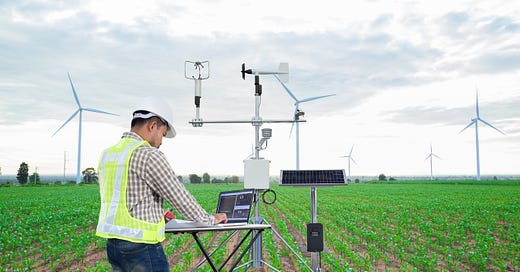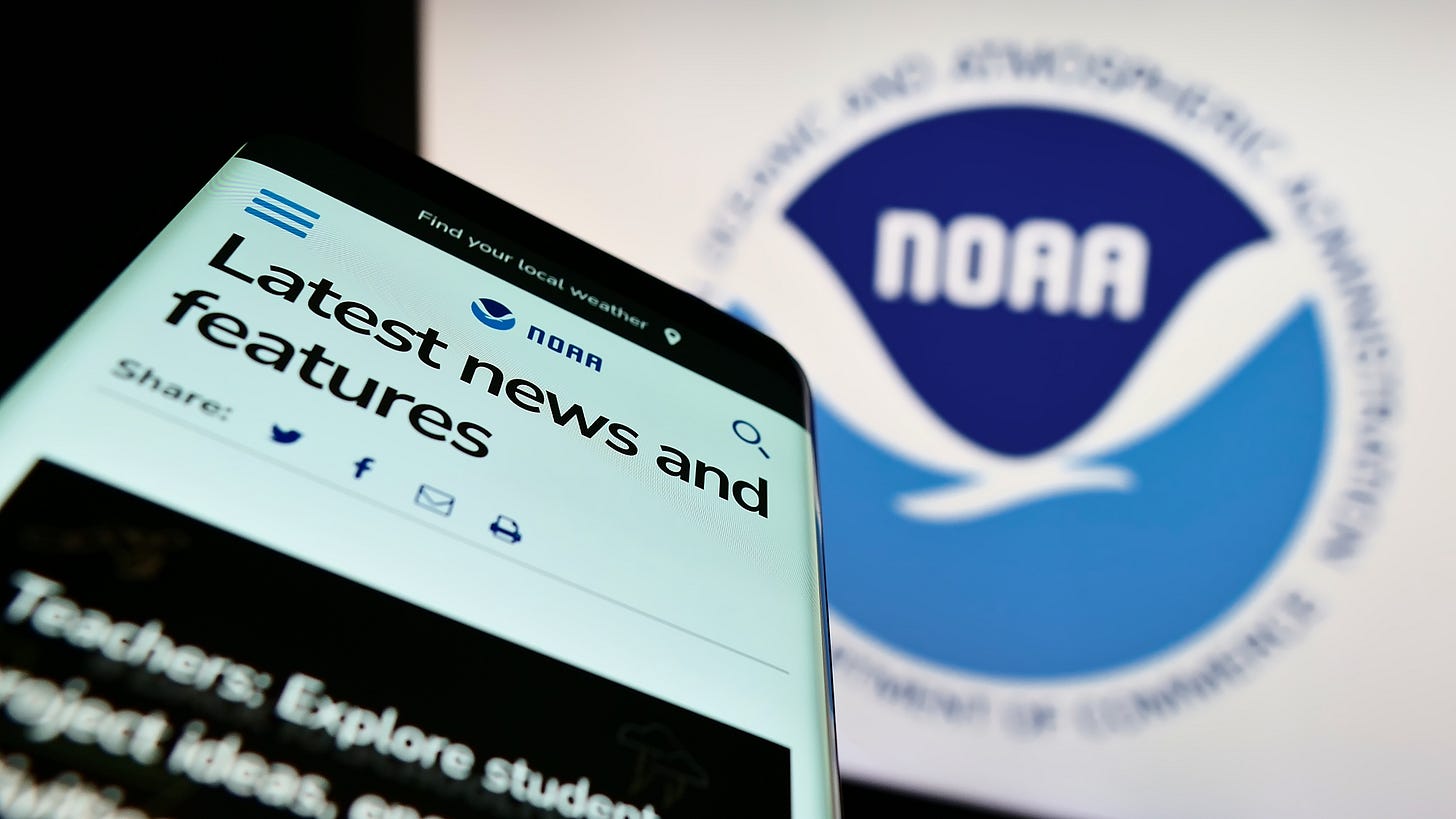Only the private sector can stop the privatization of NOAA
There’s been lots of talk about dismantling, downsizing, or privatizing the National Oceanic and Atmospheric Administration. Will businesses that depend on NOAA's work speak up before it’s too late?
As elements of our financial system reprice to take into account the realities of rapidly accelerating climate change, business-minded people who might have been confident that the whole thing was a hoax are starting to change their minds. No amount of hectoring could convince them, but the reality that their home insurance premiums are suddenly climbing slowly changes their view.
Here's NASA scientist Dr. Kate Marvel talking about her father:
I would love to say that I changed my dad's mind about climate change. That his beloved daughter, who he talks to every week, finally brought him around. And he has come around on climate change, but that's not what changed his mind. The thing that changed his mind was insurance companies—the fact that every insurance company has climate scientists on staff and insurance companies are all pricing in climate risk. There is no financial incentive for them to do that. If it wasn't real, another insurance company could come along, undercut the market and offer insurance at much cheaper rates. But they don't do that because they know that it's real. And my dad was like, well, if capitalism says it's real, it's real.
Right now, we are at another crossroads where the private sector—including the all-important insurance sector—could lead the way on a climate-related issue. This time it's about whether or not government should be involved in collecting data about weather trends and providing expert advice about what is happening to the globe.
The vast repositories of data and expertise held by the National Oceanic and Atmospheric Administration (NOAA) are the targets of lots of privatization talk. It's not the first time this subject has been raised, but the pressure is greater this time: Project 2025 calls for dismantling and downsizing NOAA, about a fifth of NOAA's employees have already been let go, and many others have been nudged toward retirement. As these departures undermine NOAA's ability to function, private companies—including, Tom Perkins of the Guardian notes, Starlink and SpaceX—will likely step in.
If you see your world and its institutions essentially as a single magnificent cash flow, in which some actors have enough power to redirect certain rivulets for their own use, it makes perfect sense to make every part of the public sector that looks like a business into a private business, and then charge whatever the market can bear for what that business does.
As a grad student asked me a few years ago: "Why do we have government at all? Couldn't the private sector do everything it does, just better?" Much of NOAA looks like a business, or an input to a business—informing industries from farming to aviation to insurance. At a time when Treasury Secretary Scott Bessent has called for privatization of greater parts of the economy, NOAA is a likely target.
But many US businesses and industry sectors don't have the view that everything that can be privatized, including NOAA, should be. Late last month, the Reinsurance Association of America wrote to Secretary of Commerce Howard Lutnick—NOAA is part of the Department of Commerce—expressing its support for the "work, workforce, partnerships, and funding" of NOAA. The letter points out how vital NOAA is to industry sectors across the country, and concludes: "Perhaps no other federal entity facilitates greater economic and commercial activity than NOAA and its data sources."
Now, you could say this view serves the business interests of reinsurers and insurers, and you would be right: They rely directly on free public NOAA data (or on private climate modeling firms that rely on that NOAA data) to drive their actuarial predictions, and don't want to see access to NOAA's extraordinary data holdings and expertise interrupted or replaced by fee-for-service activities. It is not just the insurance business that is worried about NOAA's fate: civil engineers, farmers, retailers, and others collaborate with NOAA on developing infrastructure standards and new data products and tools that are aimed at helping us all keep going in the face of increasingly extreme weather conditions, and have spent tens of millions to get this work done. Why? Because they trust NOAA and rely on its work.
The next step is to have more businesses step up publicly to say they support NOAA's work. Those public statements need to reach Republican members of Congress and state governors' offices.
This will take courage. No one wants to stick their neck out these days, and trade associations normally want to act quietly through face-to-face meetings, especially when a new administration comes to DC. But these are not normal times. Those face-to-face Washington encounters aren't happening—I have heard that large trade associations are not getting meetings with NOAA or Commerce leadership right now. No one can figure out where the bridges are, where the reasonable people are to work with. On the inside, NOAA employees aren't being asked by the White House what the impacts of these cuts will be. And meanwhile much of NOAA's leadership is being fired or walking away.
NOAA's functioning is highly relevant to our ability as a country to thrive as rapidly accelerating climate change continues to upend the structures on which human lives depend. It's not just weather data. Take a hard look at that insurance association letter: NOAA's work is also cutting edge atmospheric and oceanic science. It's stewardship of our coastlines and our publicly-overseen fisheries running hundreds of miles off those coasts. We're facing yet another humdinger of a hurricane season, and we need NOAA's work and expertise.
But if we're looking to change the privatization mindset now threatening NOAA's existence, it is likely only the private sector's voice will do the trick.







Its NOAAs own fault for not sticking to science.